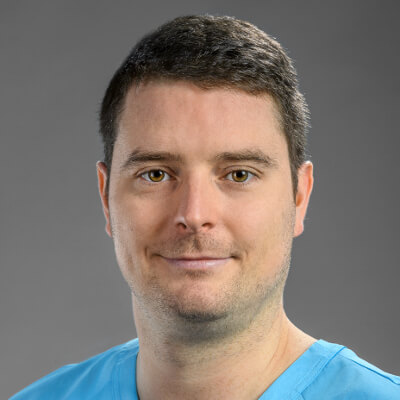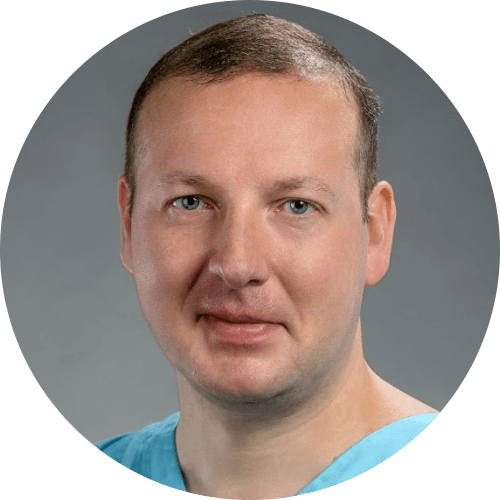Periodontology
Periodontal disease or periodontitis is one of the most complex oral conditions. Its causes are multifactorial, and the treatments are usually described by combining different disciplines of dentistry and aim to stop the extension of the disease and to stabilize the teeth on the arch.
Simplified, periodontal disease is a condition of the periodontium, i.e., the structure that supports the tooth in the oral cavity. Because the periodontium is a complex system made up of several types of tissue, so periodontitis can have several “faces”: it can be inflammatory, it can involve a loss of tissue, it can be painful or painless, and in some severe cases, it can even lead to tooth loss. Depending on the severity of the condition, in our clinic we can recommend various medical approaches in the management of these conditions:
Gingivitis – inflammation and / or bleeding of the gums
- Professional teeth cleaning and regular check-ups.
- Dental hygiene training with the recommendation of the proper methods for each patient (type of dental floss, water-pik, type of toothpaste or mouthwash, etc.).

Periodontitis – advanced inflammation of the gums and / or bone around the tooth, with the formation of “periodontal pockets” (these can be described as inflammatory spaces or openings around the tooth, in which specific bacteria are found):
- Professional teeth cleaning and regular check-ups.
- Dental hygiene training with the recommendation of the proper methods for each patient (type of dental floss, water-pik, type of toothpaste or mouthwash, etc.).
- Instillations with medicine that reduce inflammation and speed healing.
- Specific treatments in periodontal disease: periodontal curettage or periodontal splinting.
- Treatment of dental problems that appear as a consequence of periodontal disease: fluoride treatment, fillings, root canal treatments, management of noncarious cervical lesions, etc.
- In advanced stages, when none of the methods will lead to dental preservation, we might recommend tooth extraction and replacement (either through a dental bridge or prosthesis or with the help of dental implants).
- Keep under observation.
- with the recommendation of the proper methods for each patient (type of dental floss, water-pik, type of toothpaste or mouthwash, etc.).

Gingival or bone resorption – loss of gingival / bone tissue:
- Professional teeth cleaning and regular check-ups.
- Dental hygiene training with the recommendation of the proper methods for each patient (type of dental floss, water-pik, type of toothpaste or mouthwash, etc.).
- Instillations with medicine that reduce inflammation and speed healing.
- Specific treatments in periodontal disease: periodontal curettage or periodontal splinting.
- Treatment of dental problems that appear as a consequence of periodontal disease: fluoride treatment, fillings, root canal treatments, management of noncarious cervical lesions, etc.
- In advanced stages, when none of the methods will lead to dental preservation, we might recommend tooth extraction and replacement (either through a dental bridge or prosthesis or with the help of dental implants).
- Keep under observation

Periodontal curettage involves sanitation of the periodontal pockets with specially designed tools or with the help of a laser. The intervention is performed under local anesthesia, the dentist or oral surgeon will gently and meticulously remove all irritating factors, such as: tartar, bacterial plaque, diseased tissue and microbes from the periodontal pocket. In addition, the surface of the roots will be smoothed to allow the gum to stick back and heal.
Periodontal splinting will be recommended to patients who have teeth with advanced mobility, because their pathological movement weakens bone support over time. This intervention is painless and, as the name suggests, is done by fixing the loose teeth together, with the help of special systems (either splints, kevlar tape or orthodontic wire and composite filling material). A unitary whole will be formed, which will more easily cope with the masticatory forces. Particular attention is paid to the correct positioning, because it must be comfortable too and without interference. The task of maintaining optimal dental hygiene through the means recommended by our doctors remains to the patient.
Management of noncarious cervical lesions is required when there is a loss of enamel on the teeth (in more advanced cases, even dentin), in the vicinity of the gums, similar to a groove or a fracture. They can be both painful or painless, may be accompanied by gingivitis or periodontitis, and may occur independently of periodontal disease, but they are an important initial sign of bite trauma or show a vicious habit that can lead to periodontitis. In addition to dealing with the cause that led to their appearance in the first place, through protecting them either with an esthetic filling (most of the time), crowns or veneers we will eliminate tooth sensitivity or hypersensitivity and we will slow down or even prevent them from spreading to the deeper layers of the tooth.

What to do and what to expect if you suffer from periodontal disease?
If you experience one or more of the above symptoms (bleeding gums, loose teeth, hypersensitivity, gum resorption etc.), we recommend that you schedule an appointment at our clinic, in order to establish a correct diagnosis and a treatment plan for your particular case.
We need to take a digital panoramic X-Ray or a CT scan (CBCT) to detect the spread of the condition. The specific periodontal examination will help us determine the depth of the periodontal pockets. After analyzing all aspects, we will choose a medical approach that we will discuss in detail during your initial appointment.
The most important thing in periodontal disease is proper dental hygiene, regardless of the stage of the disease. We want our patients to acquire healthy eating habits and to learn how to maintain the best possible oral health, so our recommendation is, as always, to:
- Brush your teeth at least twice a day (morning and evening) and clean between your teeth with floss and / or a water-pik every day.
- Use the oral care products recommended by our doctors to ensure that they meet the appropriate safety and efficacy standards for you.
- It is recommended to avoid extremely hard foods, chewing ice or other hard objects, such as pencils, seeds or fruit kernels.
- Make sure you schedule regular dental check-ups and professional teeth cleanings at our clinic.
DIAGNOSIS
PROPHILAXYS
DENTAL ESTHETICS
DENTAL PROSTHETICS
DENTAL SURGERY
PERIODONTOLOGY
For any questions or making an appointment, please get in touch
If you need an appointment please contact us.
Get to know us

Dr. Molnár Lehel Ferenc
Dentist & specialist in oral surgery

Dr. Alexandra Cristina Rus
Dentist

Dr. Molnár Szabolcs Mihály
Dentist

Dr. Huber Gergely
Orthodontist
Contact
If you have any questions or would like to make an appointment, do not hesitate to contact us!
Molnar Dental
Várkerület 43
H-9400 Sopron
Ungaria
Telefon
+43 (676) 699 77 35
+36 (30) 146 9080
info@molnardental.com
OPENING HOURS
| Mo: | 8:30-18:30 |
| Tu: | 8:30-18:30 |
| We: | 8:30-18:30 |
| Th: | 8:30-18:30 |
| Fr: | 8:30-18:30 |
| Sa: | 8:30-18:30 |
| Su: | closed |
Visit by prior appointment.
CONTACT
Address: Várkerület 43
9400 Sopron, Hungary
+43 (676) 699 77 35
+36 (30) 146 9080

